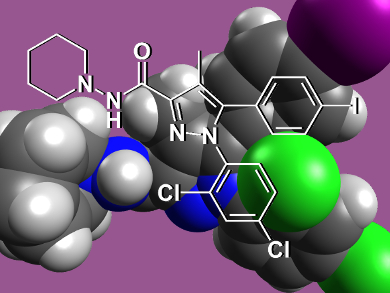Hepatitis C is a serious disease that can lead to liver failure or liver cancer. The current antiviral drugs block hepatitis C virus (HCV) replication and improve patient outcome, but cause strong side effects and are expensive, thus calling for alternatives.
Mark Douglas, University of Sydney (Westmead Hospital), Australia, and colleagues discovered that HCV replication can be blocked using AM251 (pictured above), a selective antagonist of cannabinoid 1 receptors (CB1). These proteins are present on the surface of liver cells where they regulate the metabolism of lipids. The researchers demonstrated that CB1 inhibition by AM251 reduced the viral replication in vitro by interfering with the synthesis of lipids.
CB1 antagonists may, therefore, represent a novel class of drugs to treat hepatitis C.
- Endocannabinoid CB1 antagonists inhibit hepatitis C virus production, providing a novel class of antiviral host targeting agents,
Mahsa Shahidi, Enoch S.E Tay, Scott A. Read, Mehdi Ramezani-Moghadam, Kazuaki Chayama, Jacob George, Mark W. Douglas,
J. Gen. Virol. 2014.
DOI: 10.1099/vir.0.067231-0



